MercoPress. South Atlantic News Agency
Tag: Nicolas Maduro
-
Wednesday, April 24th 2024 - 15:21 UTC
UN Human Rights Office to resume operations in Venezuela following agreement with Maduro
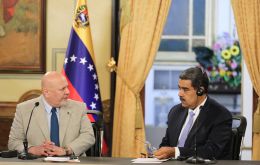
The office of the United Nations High Commissioner for Human Rights (OHCHR) is set to return to operate in Venezuela, signaling a thaw in relations between the South American nation and the international community. The announcement came from President Nicolas Maduro during an event at the Miraflores presidential palace on Tuesday, where he was joined by International Criminal Court (ICC) prosecutor Karim Khan, who is currently investigating Venezuela for possible crimes against humanity.
-
Wednesday, April 24th 2024 - 10:00 UTC
ALBA summit in Venezuela draws regional leaders amid calls for unity
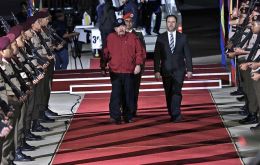
The President of Nicaragua, Daniel Ortega, joined other regional leaders in Caracas on Wednesday for the summit of the Bolivarian Alliance for the Peoples of Our America (ALBA), underscoring a renewed focus on cooperation and solidarity among member nations.
-
Wednesday, April 17th 2024 - 20:11 UTC
Celac joins worldwide condemnation of Ecuador's actions against Mexican Embassy
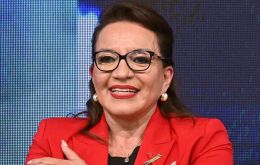
Leaders of the Community of Latin American and Caribbean States (Celac) Tuesday agreed to condemn Ecuador's April 5 storming of the Mexican Embassy in Quito to abduct former Vice President Jorge Glas, who had sought asylum there after being convicted on corruption charges.
-
Monday, April 15th 2024 - 23:59 UTC
Chilean FM says conditions not met for free elections in Venezuela

The Chilean Government of President Gabriel Boric Font is adopting a neutral stance regarding Venezuela's political crisis by keeping active ties with the administration of President Nicolás Maduro as well as with disenfranchised opposition leader María Corina Machado. However, “there are no conditions for free elections in Venezuela,” Santiago's Foreign Minister Alberto van Klaveren told reporters during the weekend.
-
Friday, April 5th 2024 - 21:04 UTC
Maduro angered by Milei's calls to sanction Venezuela
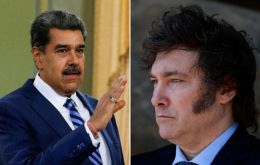
President Nicolás Maduro Thursday criticized his Argentine counterpart for promoting sanctions against Venezuela. The Bolivarian successor of Hugo Chaves Frías stressed that with Milei came “fascism” and “Zionism, which is the new fascism.”
-
Wednesday, April 3rd 2024 - 19:02 UTC
Oldest man on earth dies aged 114
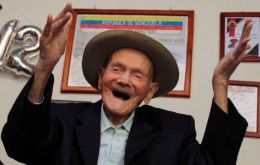
Venezuelan national Juan Vicente Pérez Mora passed away Tuesday due to respiratory complications at the age of 114 in San José de Bolívar, Francisco de Miranda municipality, in the state of Táchira. He was certified by the Guinness World Record on Feb. 4, 2022, as the oldest man on earth. He had been born in El Cobre, Táchira State, on May 27, 1909.
-
Saturday, March 30th 2024 - 09:58 UTC
Unusual criticism from Lula da Silva and Petro on Venezuela's presidential race controversy
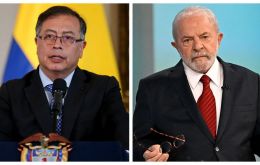
Renowned South American political figures Luiz Inácio Lula da Silva, President of Brazil, and Gustavo Petro, head of state of Colombia, have taken an unusual stance against Venezuela's government, criticizing its refusal to allow opposition candidate Corina Yoris to register for the upcoming presidential elections.
-
Thursday, March 28th 2024 - 11:40 UTC
Venezuela: Rosales claims he is not Maduro's candidate
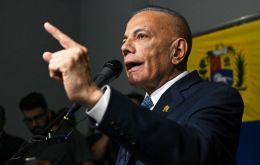
Former Zulia governor Manuel Rosales, who once challenged the late Hugo Chávez Frías for Venezuela's presidency, said he was willing to withdraw from this year's July 28 elections if another opposition candidate made it through the restrictions imposed by Nicolás Maduro's regime. “I am not Maduro's candidate,” he insisted after becoming the most prominent contender on behalf of a fragmented opposition.
-
Wednesday, March 27th 2024 - 11:45 UTC
Maduro's regime consolidating as a dictatorship, says Uruguay's FM
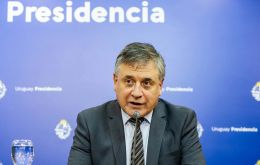
Uruguay's Foreign Minister Omar Paganini Tuesday said that Nicolás Maduro's regime was “consolidating itself as a dictatorship” after the main opposition candidates were unable to compete in the July 28 presidential elections. Paganini also underlined that Venezuela was “moving away from any possible democratic practice.”
-
Wednesday, March 27th 2024 - 10:52 UTC
Power outages hit Argentine Embassy in Caracas after granting asylum to opposition leaders

The Government of President Javier Milei denounced the power outage at the Argentine Embassy in Caracas after the Libertarian administration granted asylum to a group of Venezuelan nationals chased by the Nicolás Maduro regime.
